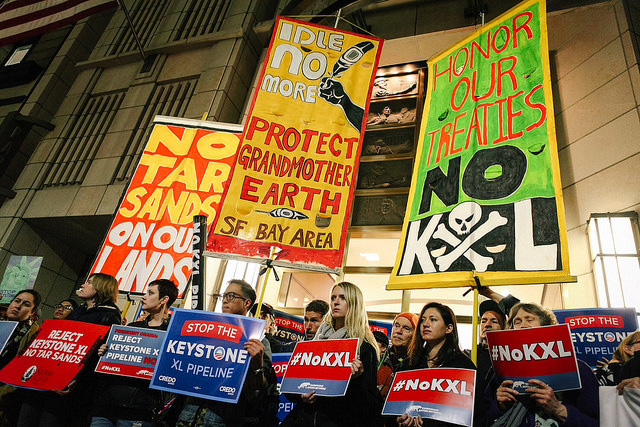
It’s been less than 48 hours since a panel in Nebraska gave final approval for the Keystone XL pipeline to built in the state, but already more than 8,000 people have vowed to put their bodies on the lines — and in front of the construction path, if needed — to make sure the construction never happens.
The vow to stand against the pipeline — dubbed the “Promise to Protect” — was launched Monday during a gathering of Indigenous leaders and their allies in South Dakota who renewed their vows to defend sacred lands, waters, and sites against new pipelines and any expansion of the Canadian tar sands. The petition was then endorsed by other Native tribes, green groups, and high-profile climate activists.
Joye Braun, leader of the Wakpa Waste Camp at the Cheyenne River Sioux Reservation in South Dakota, said, “It gives me a great sense of hope and community to see nearly 8,000 people who have signed on to the ‘Promise to Protect’ our water, our homelands, our people, and to stand in solidarity with us on the ground. Especially our Indigenous communities, our tribes, and our farmer and rancher friends. This is hope, this is power — people power.”
Faith Spotted Eagle, member of the Yankton Sioux Nation, said the surge of people commiting to stand against Keystone XL shows the Monday’s decision was not a win for pipeline owner TransCanada. “Continued attempted assaults on Mother Earth are never winning actions,” she said. “The No KXL Dakota/Lakota gathering at Kul Wicasa on the same day of November 20 is an exciting renewed strong circle of allies who walk forward stronger than ever. We will prevail in our spiritual movement.”
People can sign the petition as individuals, but entire organizations can also make the commitment.
“TransCanada has many hurdles still ahead on Keystone XL, and if they ever run out, thousands of people have promised to be the biggest one,” added May Boeve, exectuive director of 350.org, also backing the petition. “This pipeline’s route through the upper Midwest has been hampered at every turn for nearly a decade, and we’re doing all we can to keep it that way.”
As the petition states:
We — Indigenous leaders, farmers and ranchers, students, scientists, faith leaders, and more — will make a series of peaceful stands along the proposed pipeline route; resolute displays of our continuing opposition to a plan that endangers the waters of the Midwest and the climate of our one earth. Water is life; climate is life–those will be our rallying cries against a project that will endanger both.
We know asking you to travel is asking a lot. The pipeline route is far away from where most people live. But the Indigenous people, farmers and ranchers of the region have fought this good fight for years now and we owe it to them to be there at the critical moment, when they ask us to be.
“We honestly don’t know if we can hold the line against Keystone XL forever — but we know that we have a chance,” the statement adds. “If we make a stand now it will improve our odds in a thousand other similar fights happening now and in the years ahead.”
Join us in defending the truth before it’s too late
The future of independent journalism is uncertain, and the consequences of losing it are too grave to ignore. To ensure Truthout remains safe, strong, and free, we need to raise $27,000 in the next 24 hours. Every dollar raised goes directly toward the costs of producing news you can trust.
Please give what you can — because by supporting us with a tax-deductible donation, you’re not just preserving a source of news, you’re helping to safeguard what’s left of our democracy.